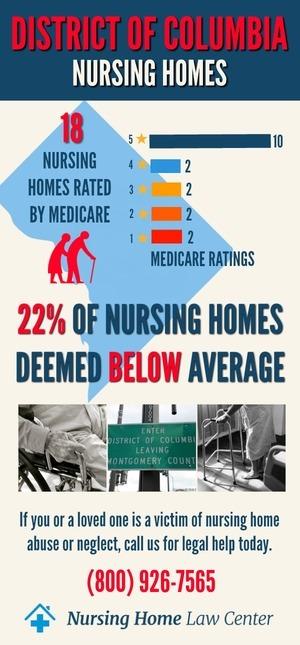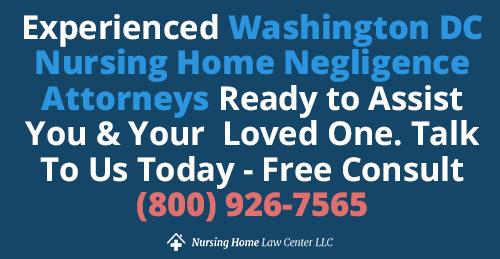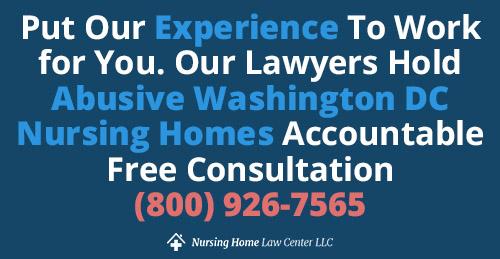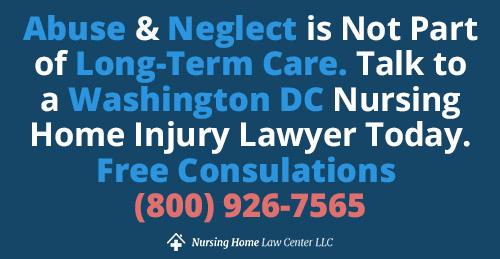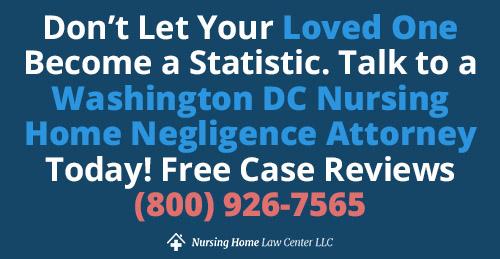The Nursing Home Law Center is committed to providing the legal resources necessary to hold negligent facilities accountable.
Washington DC Nursing Home Abuse Lawyer
The scourge of nursing home neglect and abuse causes irreparable harm to residents, undermining their safety and dignity. This systemic issue highlights a critical need for vigilance and reform in long-term care practices.
Nursing Home Law Center, LLC is a critical resource for victims seeking justice and healing. With a team of skilled nursing home abuse lawyers, we are dedicated to holding negligent parties accountable and improving the standard of care for all residents.
Nursing Home Statistics in Washington, DC
The latest evaluations conducted by the Centers for Medicare and Medicaid Services (CMS) in January 2024 reveal concerning statistics regarding the quality of care provided in Washington, DC, nursing homes. Of the 109 nursing homes in the District of Columbia, 38, accounting for approximately 35%, received ratings of “below average” or “much below average” in their overall quality measures.
These ratings raise significant concerns about the standard of care and safety for elderly residents in many nursing homes in the nation’s capital. Furthermore, some of these facilities have been cited for instances of nursing home abuse and neglect, emphasizing the urgent need for improved elder care in Washington, DC.
In Washington, DC, inspectors have cited the following facilities for abuse:
- Alexandria Rehabilitation and Health Care Center
- Birmingham Green Nursing Home
- Bridgepoint Subacute and Rehabilitation Capitol Hill
- Capital City Rehabilitation and Health Care Center
- Clinton Health Care Center
- Deanwood Rehabilitation and Wellness Center
- Kensington Health Care Center
- Mount Vernon Health Care Center
- Serenity Rehabilitation and Health Care Center

The Reality of Nursing Home Abuse in The District of Columbia
The widespread issue of nursing facility abuse in Washington, DC, is a troubling reality that affects a significant number of elderly residents. Instances of emotional or physical abuse and neglect are unfortunately common in many facilities. Our law firm is dedicated to bringing these issues to light and advocating for the rights and safety of the elderly.
The impact of such abuse on the elderly cannot be overstated. It often leads to serious health problems, emotional distress, and, in severe cases, even wrongful death. As nursing facility abuse lawyers, we witness firsthand the devastating effects of abuse on both the victims and their families.
Our goal is to not only provide legal representation but also to raise awareness about the prevalence of nursing home abuse. By educating the public and nursing home staff, we aim to prevent future instances of abuse and create a safer environment for all nursing home residents in Washington, DC.
Defining Abuse and Neglect
Understanding the various forms of nursing home negligence and abuse is crucial in identifying and addressing these issues effectively:
- Physical Abuse: This includes injuries such as bruises, cuts, or broken bones, which are often unexplained or inconsistently explained by staff members.
- Emotional Abuse: Signs of depression, withdrawal, or fear, particularly in the presence of certain staff members or other residents, are indicative of emotional mistreatment.
- Sexual Abuse: This involves indications of non-consensual sexual contact, including physical signs or sudden changes in behavior.
- Financial Abuse: Unexplained withdrawals from bank accounts, changes in wills, or missing personal belongings point to financial exploitation.
- Nursing Home Neglect: Obvious signs of poor hygiene, malnutrition, or untreated medical conditions suggest a lack of proper care.
- Medication Errors and Medical Malpractice: These occur when there isimproper medication management or medical care.
- Abandonment and Isolation: This type of neglect involves leaving residents without the necessary social and medical support.
Identifying Signs of Nursing Home Abuse
Recognizing the indicators of nursing home abuse is crucial for early intervention and legal action. Our Washington, DC, nursing home abuse lawyers are skilled in identifying these signs and guiding families through the necessary steps to protect their loved ones.
Physical Abuse and Injury Manifestations
Physical signs of abuse, such as unexplained bruises, injuries, or over-tightened restraints, are often the most prominent indicators. These injuries can range from minor bruises to more severe forms like broken bones or head injuries. Family members and nursing home staff must take note of these signs and investigate their causes promptly.
Emotional and Mental Anguish
Understanding the non-physical forms of abuse and their impact on nursing home patients is critical. Emotional and mental abuse can be as damaging as physical harm, often leaving deep psychological scars.
Shifts in mood, withdrawal, or depression can be potential signs of emotional and mental abuse in nursing home settings. These changes may be subtle and gradual, making them difficult to detect immediately.
Emotional abuse in nursing homes can include verbal assaults, threats, humiliation, or intentional isolation from activities and social interactions. These actions can lead to a decline in the resident’s mental health, causing feelings of worthlessness, fear, or anxiety.
Our Washington DC nursing home abuse and negligence attorneys work closely with mental health professionals to assess and document the impact of emotional distress on residents. This collaborative approach ensures that any legal claim adequately addresses the psychological effects.
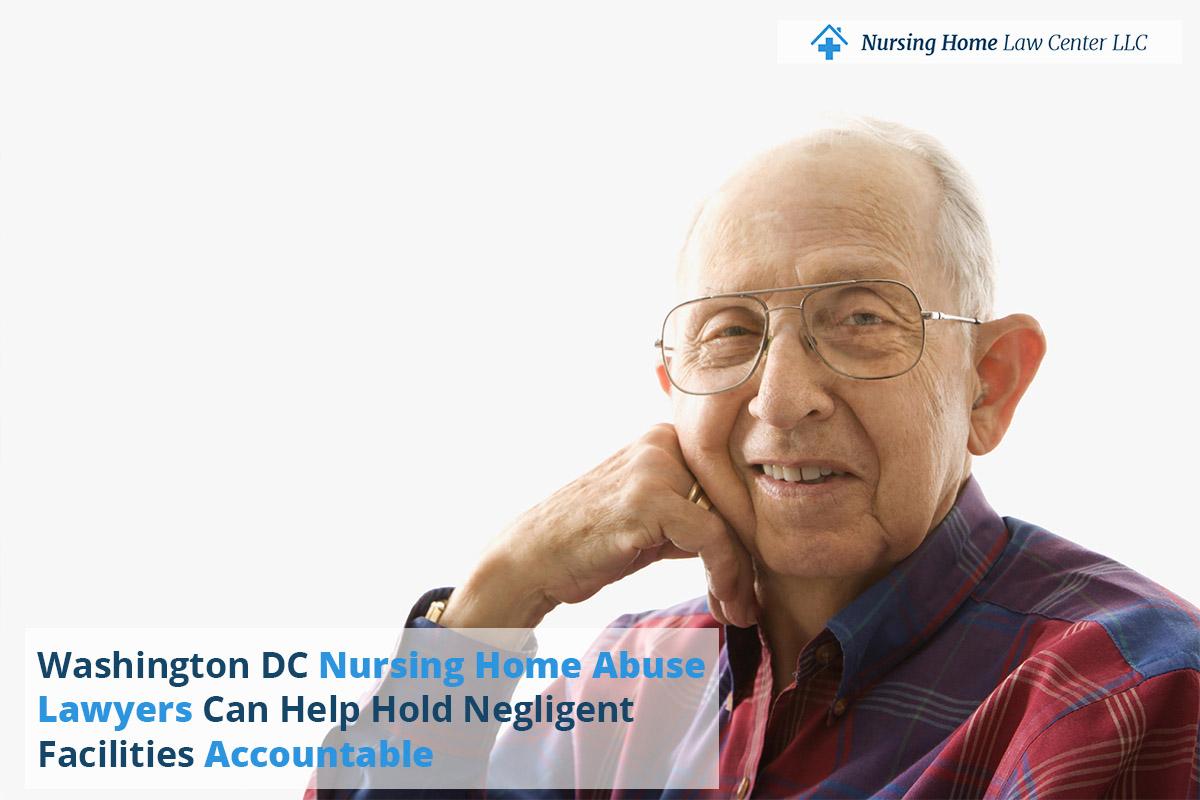
Recognizing and Addressing Nursing Home Neglect
Highlighting the various forms of neglect in nursing facilities and their legal implications is a key focus of our practice. We aim to shed light on this often-overlooked aspect of elder abuse.
Indicators of Nursing Home Negligence
Nursing home neglect, while less visible than physical abuse, can be equally harmful. Neglect can manifest in various forms, from lack of proper hygiene resulting in conditions like bed sores to failure to provide necessary medical treatment for existing health conditions. Critical indicators of neglect in nursing homes can include:
- Poor hygiene
- Dehydration
- Unexplained injuries
- The general decline in health
These signs often point to inadequate care, whether due to understaffing, insufficient training, or neglectful behavior by nursing home staff.
Legal Approach to Neglect
Our approach to these cases involves thoroughly investigating the negligent care provided to residents. We review medical records, interview witnesses, and consult with medical experts to understand the full extent of the neglect.
Recognizing these indicators is the first step in taking legal action to protect residents and hold facilities accountable. In cases of suspected neglect, our nursing facility abuse lawyers conduct a comprehensive investigation to uncover the root causes and seek justice for the affected individuals.
Establishing Abuse Evidence in Nursing Care Homes
Proper documentation of these physical signs is vital in building a case. Key pieces of evidence that our nursing home neglect attorneys use to establish a pattern of abuse and hold the responsible parties accountable include:
- Photographs
- Medical report
- Witness testimonies
In many cases, physical abuse may be hidden or explained away as an accident. However, recurrent injuries or a pattern of unexplained harm should raise immediate concerns. Our law firm analyzes these signs and determines whether they indicate nursing home negligence or abuse.
Legal Responsibility and Liability
The duty of care in nursing homes extends to protecting residents from emotional and mental harm. Facilities and staff are legally responsible for providing a safe and respectful environment. Failure to do so can result in legal liability for emotional pain and abuse.
Our law firm explores the legal responsibility of nursing home facilities in cases of emotional trauma. We examine the facility’s policies, staff training, and overall environment to establish liability. In cases where emotional trauma is evident, we pursue legal action to hold the facility and its staff accountable.
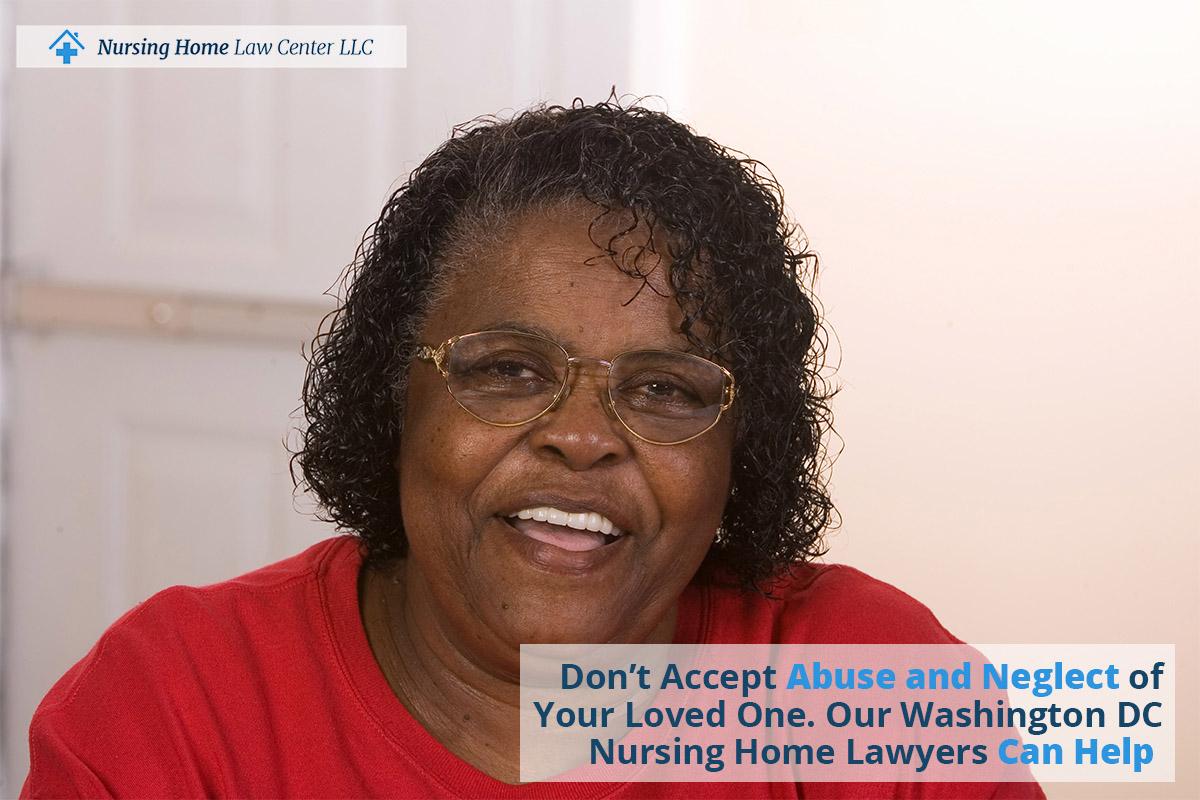
The Role of Family in Nursing Home Abuse Cases
Each family member plays a vital role in legal cases against abusive nursing home facilities. Their involvement can be crucial in gathering evidence, supporting the victim, and ensuring a successful legal outcome.
Families’ Contribution to Case Evidence
Family input is often invaluable in building a solid nursing facility abuse case. They can provide firsthand accounts of changes in the resident’s condition, interactions with the nursing home staff, and any observed concerns. This information can be pivotal in establishing a pattern of abuse or neglect.
We work closely with families to gather all relevant evidence, including photographs, personal notes, and any communication with the nursing home facility. This collaborative approach ensures we comprehensively understand the case and the best chance of success.
Communication and Emotional Support for Victims
The family’s role extends beyond the case’s legal aspects. Providing emotional support and effective communication with the victim is essential. Families can help victims feel heard and validated, which is critical for their emotional well-being during this challenging time.
Our attorneys recognize the importance of maintaining open lines of communication between the family, the victim, and the legal team.
Advocating for Victims of Washington DC Nursing Home Abuse and Neglect
Our Nursing Home Law Center, LLC, specializes in representing victims of nursing facility abuse and neglect in Washington, DC. Our team of experienced lawyers and attorneys is committed to providing compassionate, professional legal assistance to families and individuals affected by such incidents. We understand the delicate nature of these cases and approach each situation with the empathy and expertise it deserves.
Washington DC Nursing Home Abuse Lawyer
At our law center, Nursing Home Law Center, LLC, we are deeply committed to protecting the elderly in Washington, DC, from caregiving home negligence and abuse. Our experienced Washington, DC, nursing home abuse lawyers understand the complexities of these cases and are dedicated to ensuring that nursing home victims receive the justice and care they deserve.
The prevalence of nursing home abuse in Washington, DC, is a significant concern that demands our utmost attention and expertise. Our team of dedicated attorneys specializes in identifying, addressing, and litigating cases of abuse and neglect within nursing home facilities.
Our approach is multifaceted, combining legal acumen with a compassionate understanding of the emotional and physical toll such abuse can take on an elderly person and their elderly loved ones. We provide comprehensive legal services, from conducting thorough investigations to representing clients in court, ensuring that all aspects of the abuse are addressed.
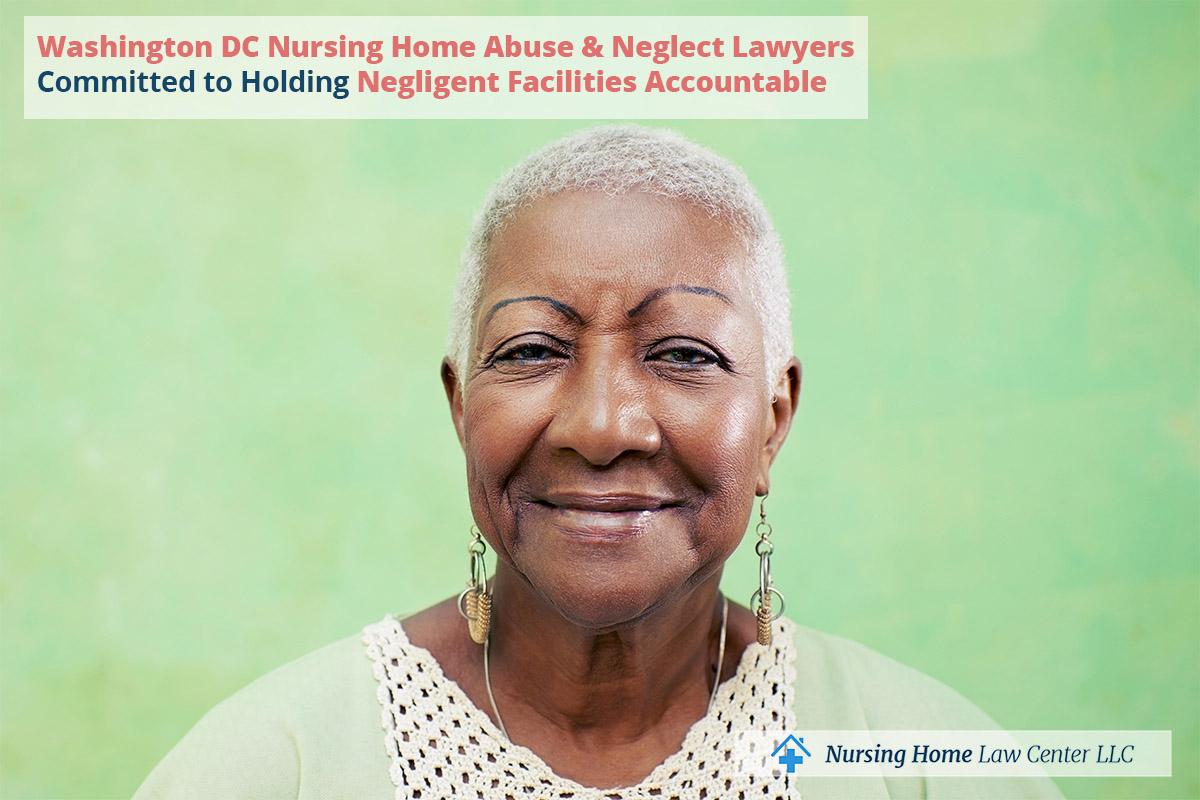
Legal Approaches to Elder Abuse and Neglect
Our strategic legal methods are tailored to address and rectify nursing home misconduct in Washington, DC. We combine legal expertise with a compassionate approach to ensure that victims of elder abuse and neglect receive the justice they deserve.
Nursing Home Liability
In cases of elder abuse and neglect, one of our primary objectives is to establish the liability of the nursing home facility. This involves proving that the facility failed to provide the standard of care required by law, leading to abuse or neglect. Criteria for liability can include:
- Negligent hiring practices
- Inadequate staffing
- Failure to provide necessary medical care
Our nursing facility abuse lawyers meticulously gather evidence, including staff records, surveillance footage, and medical reports, to build a strong case. We examine all aspects of the nursing home’s operations to identify any breaches in duty of care.
Grounds for Filing Washington DC Nursing Home Abuse Damage Claims
Understanding the legal grounds for filing a nursing home abuse claim is essential for victims and their families. Our law firm helps clients navigate these complex legal waters, explaining the grounds for claims such as:
- Nursing home negligence
- Breach of contract
- Violation of residents’ rights
Seeking Justice and Compensation: Avenues for Redress
Exploring options for legal redress is an essential step for victims of nursing home abuse. Our nursing facility abuse lawyers guide clients through various avenues, including negotiating insurance settlements or pursuing court awards.
Our Washington, DC, nursing home abuse attorneys provide comprehensive legal advice on the steps families can take. We understand the importance of securing compensation that covers all aspects of a victim’s suffering. This includes
- Medical expense
- Pain and suffering
- Loss of quality of life
- Wrongful death – compensation for the family’s loss
We aim to ensure that victims and their families receive the total compensation they are entitled to under the law.
Reporting Nursing Home Abuse
Do you suspect caregiving home abuse is because your loved one is harmed? In Washington, DC, the protection of nursing home residents from abuse and neglect is taken very seriously. Nursing homes and other long-term care facilities are places where the elderly and vulnerable should receive care and compassion, not suffer harm.
It is crucial to report these incidents to ensure the safety of residents and hold a nursing home accountable when:
- The nursing home management fails to uphold its duty of care
- A family member suspects nursing facility abuse, or when clear signs of nursing home negligence emerge
Residents and their families must be aware that abuse can take many forms, ranging from medical malpractice to financial exploitation, and can result in wrongful death or severe injury.
Legal documents and expert witness opinions may be necessary to establish a valid claim in cases where negligent care has led to a loved one’s injuries. Caregiving facilities in the DC metro area need to provide proper medical attention to avoid such unfortunate outcomes.
Reporting Authorities and Agencies
To report suspected abuse or neglect in a nursing home, you can follow these steps:
- DC Department of Health (DC Health) at (202) 442-5955 or by visiting DC Health’s website.
- National Adult Protective Services Association (NAPSA)
- Office of the Attorney General for the District of Columbia (OAG) at (202) 442-9828 or theOAG website.
- Metropolitan Police Department (MPD) at (202) 265-9100.
Protecting Your Loved Ones from Washington DC Nursing Home Abuse
Ensuring the safety of relatives in nursing homes is of utmost importance. Our law firm provides strategies and guidance to help families safeguard their loved ones from abuse and neglect.
Regular visits to caregiving facilities are essential in monitoring the care and well-being of residents. These visits allow family members to observe the living conditions, interact with staff, and check for signs of abuse or neglect. We encourage families to be proactive in their visits and to keep a detailed record of any concerns or changes they observe.
Navigating Legal Procedures in Washington DC Nursing Home Abuse Cases
In caregiving home abuse cases, various types of damages can be claimed. Economic damages cover tangible losses such as medical bills, while non-economic damages compensate for intangible losses like pain and suffering. Punitive damages may also be sought in cases of particularly egregious conduct.
Each nursing home abuse lawyer in our law office helps clients understand the different types of compensation available and how they apply to their specific situations. This includes explaining the legal requirements for each type of injury claim and the evidence needed to support them.
The Importance of Legal Representation
Navigating the legal system can be daunting, especially in complex elder abuse cases. Having experienced Washington DC nursing home abuse lawyers by your side is essential. We provide the expertise and resources to navigate legal procedures effectively, from filing the initial nursing home negligence and abuse claim to representing clients in court.
Our nursing home abuse lawyer team remains committed to providing personalized legal representation tailored to the unique needs of each case.
Get Expert Legal Assistance from Our Washington, DC, Nursing Home Abuse Lawyers
Encouraging victims and families to seek legal aid is vital to our mission. We are dedicated to providing expert legal assistance to those affected by nursing facility abuse.
Schedule a Free Case Evaluation and Consultation
Our nursing home abuse lawyer team offers a no-obligation initial consultation for potential clients to discuss their cases. During this consultation, our experienced attorneys review the case details, provide an assessment of legal options, and answer any family questions. This initial meeting is an essential step in establishing a relationship of trust and understanding with our clients.
Contact Information for Legal Support
For immediate legal assistance and support, we provide accessible contact details. Our firm is committed to being available and responsive, ensuring that victims and their families can easily reach an experienced attorney when they need help. We encourage anyone suspecting nursing home negligence and abuse to contact us for guidance and support.
Hiring a Personal Injury Attorney: Ensuring Safety and Justice for Nursing Home Patients
Ensuring the safety and justice of nursing facility patients is a responsibility we take seriously. Our team of personal injury attorneys specializes in nursing home cases, providing the expertise and dedication needed to achieve the best possible outcomes for our clients.
Is nursing home abuse affecting you or someone close to you? Nursing Home Law Center, LLC is here to champion your cause. Our skilled legal team understands the nuances of these cases and will fight tirelessly on your behalf to ensure the long-term care facility is held legally liable.
We offer a range of services, including:
- Personal representative offering expert legal counsel
- Assistance in documentation and evidence gathering
- Strong representation in legal proceedings
- Personalized attention to each case
Contact our nursing home abuse attorneys at (800) 926-7565 for a free consultation. We proudly operate on a contingency fee basis, ensuring you get quality legal representation without financial worry.


